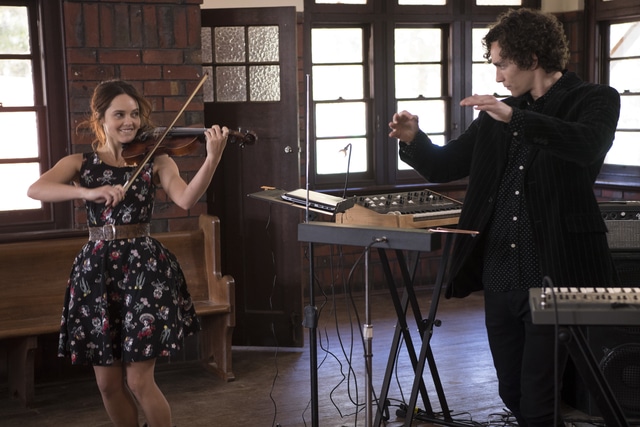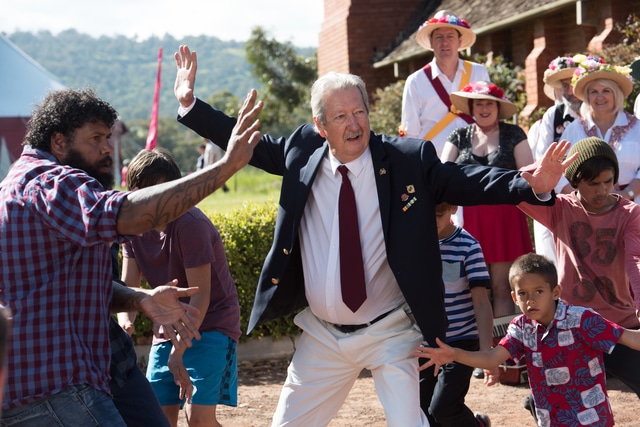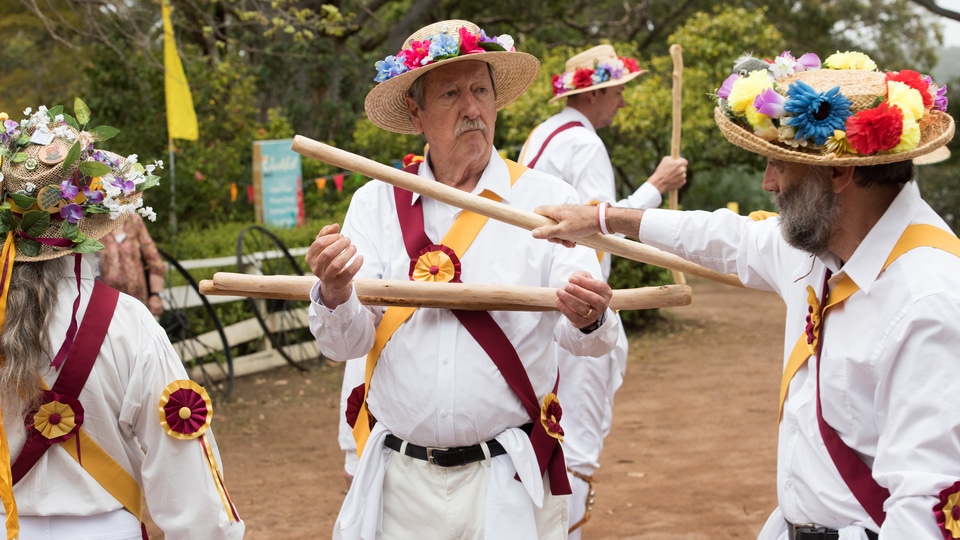Three Summers is the brand new romantic comedy from writer and director Ben Elton. Playing recently on the festival circuit, we caught up with Ben to discuss his latest endeavour.
The British comedy legend hasn’t directed a film since Maybe Baby in 2000. This latest foray into film finds Elton tackling an ensemble romantic comedy.
Three Summers stars Robert Sheehan and Rebecca Breeds with Michael Caton, Magda Szubanski, Kate Box, John Waters, Deborah Mailman, Caroline Brazier, Kelton Pell, Nichola Balestri, Jacqueline McKenzie, Peter Rowsthorn and Mahesh Jadu in support.
At a summer music festival in Australia, the lead singer of an Irish folk band (Rebecca Breeds) meets a folk music-hating Theremin player (Robert Sheehan). Other characters at the festival include an Aussie Morris Dancer (Michael Caton), an Indigenous dance troupe, a bunch of empty-nesters, a security guard, a female rock band and some musical asylum seekers. All of their stories collide, with community radio superstar Queenie (Magda Szubanski) welcoming the campers back for three summers in succession.
[brid video=”259870″ player=”531″ title=”THREE SUMMERS Official Trailer”]
Where did the idea for Three Summers come from?
I don’t know where any of my ideas come from. They come from my experiences. I always say my stuff is from everything I’ve ever seen and everyone I’ve ever met and everything I’ve ever done.
On this occasion there is quite a specific reference point in that this festival – the Westival – is actually based on a real festival, it’s called the Fairbridge Festival. It’s a little rural folk festival in regional Western Australia and we often go to this little folk festival and it just struck me that it would be a wonderful environment to set a bunch of stories because lots of different people go to festivals.
It struck me, sitting in the beer tent, how over the years it always looks the same. Every time we go to this festival it is always the same, with kids busking and teenagers trying to look cool and parents trying to get the camping gear together, but surely all their stories must have moved on – last year’s cute kids are this year’s grumpy teenagers etc. It just struck me: What a great place to set a bunch of stories about a broader Australian community.
Are you a folk music fan?
Not particularly folk. I like nice folk music. Folk music is such a big subject. I’m more a Rock and Pop man I must admit. The thing I like about this little festival is it’s not just about the music at all. It’s about a family camping weekend.
It is seventeen years since you directed Maybe Baby. Were you nervous about going back to directing?
No. I was excited as I can be. I think it is the greatest job you can possible have particularly if you’ve written the piece. You get to have the whole vision and then you get this wonderful community of people, all artists themselves, all lending art to enable your vision. So, it is an immensely stimulating and exciting prospect to be a director. We only had twenty-five days to shoot. We had a relatively tiny budget, it was three and half million Australian dollars which is about two million pounds. That is a small film budget. There was plenty to be nervous about. But certainly the excitement and the joy and the prospect dwarfed all that.
There are so many great actors and actresses coming out of Australian. What made you choose Robert Sheehan and Rebecca Breeds for the main characters of Roland and Keevey respectively?
Oh God! You’ve only got to watch the movie as I think the proof is in the pudding. They are both brilliant. I was looking for funny bones of course, people who could handle comedy but also people with real heart. People who were sympathetic. If you are looking for your romantic leads you want actors who the audiences are going to love and be attracted to.
For instance, Rob’s character can be so irritating and pedantic because he believes his musical instruments are the most important thigs and you need someone with great inner charm in order to make the character attractive. So, I was looking for heart and funny bones, and they are both terrific actors. Though I say it myself they are perfect casting.

The story seems to me to be more a classic boy-meets-girl romance without the aid of technology. Was it a conscience decision on your part not have them for example meet through a dating app and then have their first date at the festival?
She does talk about how she has been using Tinder because she is on the road all the time. She is this extremely pretty and vivacious girl and yet she is kind of locked into a life dependant on her father’s band and is always moving on. I modern technology in romance does feature but her problem is she keeps moving on and that’s why the typical nature of Three Summers of going back to the same place for three years is great for that love story because she meets the same guy the following year and the following year.
One of the main comic scenes is musical clash between an organic fiddle playing folk-y and a Theremin playing techy. In a way technology is there as well as you see him unpacking all his electric boxes and she is thinking “That’s not what I call music. I call music a violin or guitar.”
I really like the Theremin in the film. Did you get to have a play on it?
I’ve waved my arms around in front of one. My brother-in-law is a Theremin player and he is also a violin player. He actually plays both Keevey’s fiddle and Roland’s Theremin on the movie. So, when you see them playing against each other that is actually one musician who recorded both of those tracks. The music is produced and composed by my wife and him. So, it is very much a family thing.
When you see that wonderful scene, I say wonderful because I love it, when they fall in love over this jam session which almost turns into actual physical passion I said to my wife “I want you and Adam, my brother-in-law, to produce a fiddle and Theremin duet which starts off as a wary looking at each other and ends up with them making passionate love” and I think they did a brilliant job. I’m very proud of the family nature of that.
You’ve got some legendary Australian actors in the film – Michael Caton, Magda Szubanski, John Waters, Deborah Mailman – how were they to work with?
It was a joy. It sounds like a cliché, but I think it comes across on film how much everyone loved doing it. We were all in this funny little place in Pinjarra. Not a lot of luxury. We were a real community. A film set is a community, and this was a very, very happy one. These are the cream of aristocracy of Australian film and television. It was a very very happy group who were mutually very supportive.

There is an indigenous dance performed in the film. How did you ensure that it was faithful to the people and their culture?
By doing a great deal of due diligence and having an awful lot of conversations with the community and having a number of aboriginal advisors on the set. Also steeping myself in aspects of the culture that I was using. I made many good friends and I was very proud to be welcomed as an honorary member. Certainly, a lot of due diligence but I didn’t regret or resent any of that and I enjoyed and embraced every moment.
I involved myself in a number of ceremonies, which was very beautiful for me to dance under the West Australian skies to a digeridoo during the smoking ceremony. You dance in the smoke of various little fires which you make yourself. We made our own fires and they took about an hour to get the spark going from the wood sticks. A very wonderful learning process for me.
You’ve been a comedy writer for four decades. Are there differences when you are writing with Australia in mind compared to the UK?
Not really. Yes, in the obvious things like cultural differences. Comedy tells us humans are all very similar under the skin. We all have the same petty vanities and hopes and dreams and the same weaknesses. I’ve performed as stand-up comic in most parts of the English-speaking world and occasionally in non-English speaking countries and you discover that when everybody is in two queues they always think the other one is moving faster, and they have joined the wrong one.
We are all much the same in a way. Gloriously different yet gloriously similar. Writing in Australia is no different to writing anywhere else because I write about humanity, I don’t write about nationalities.
Three Summers opens in UK cinemas later this year.


